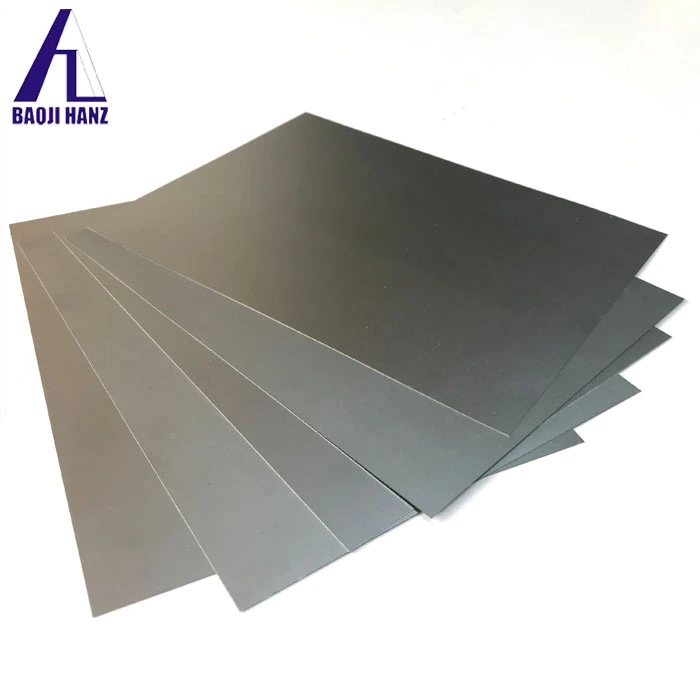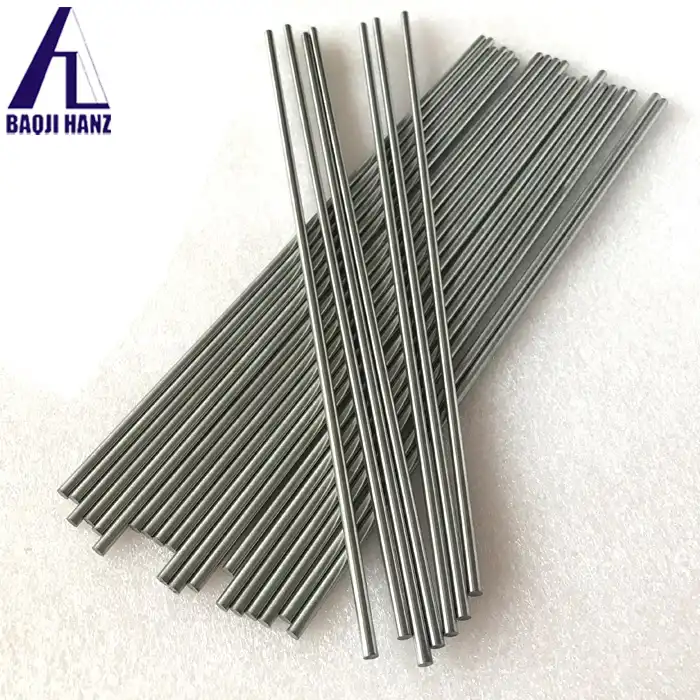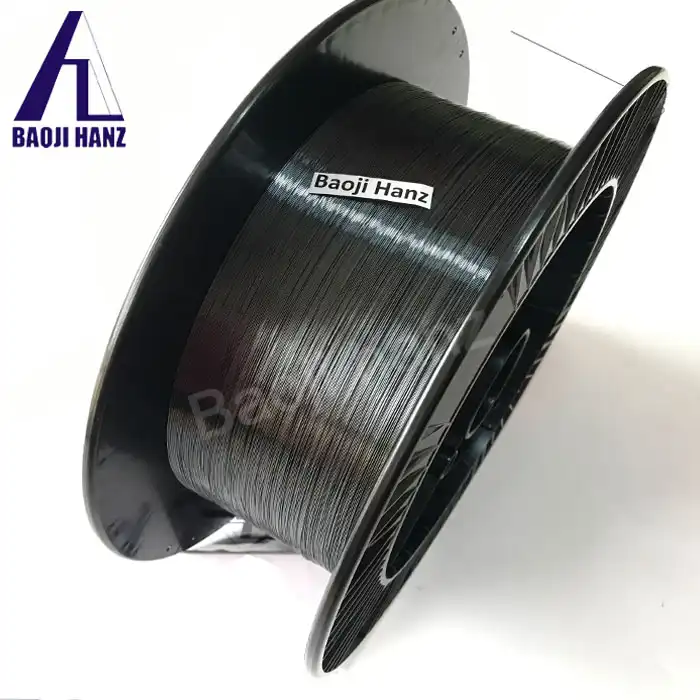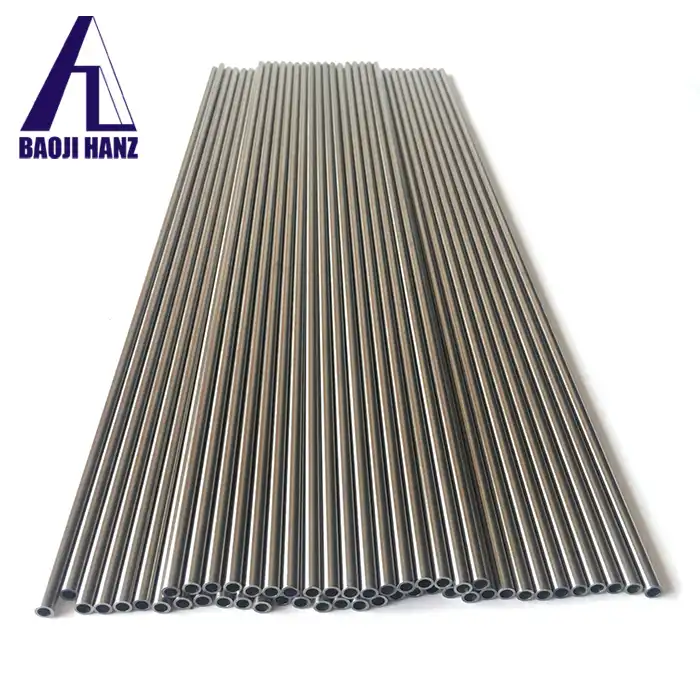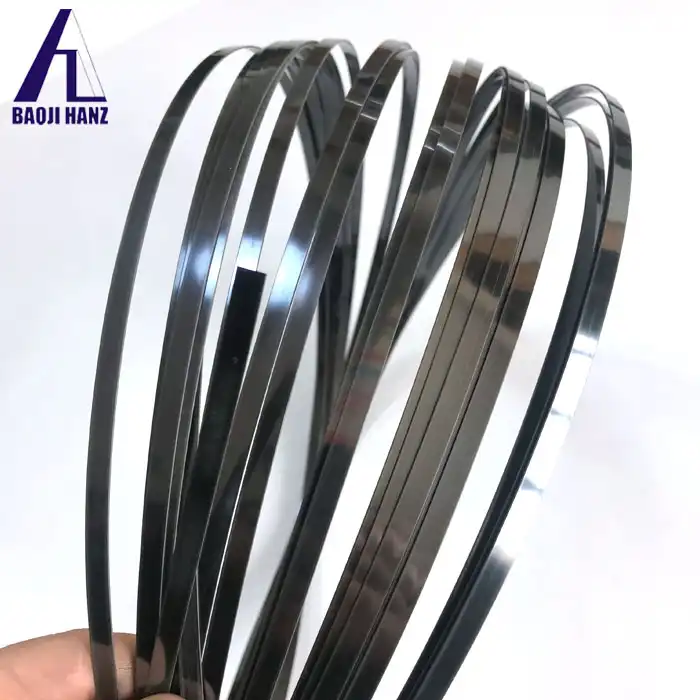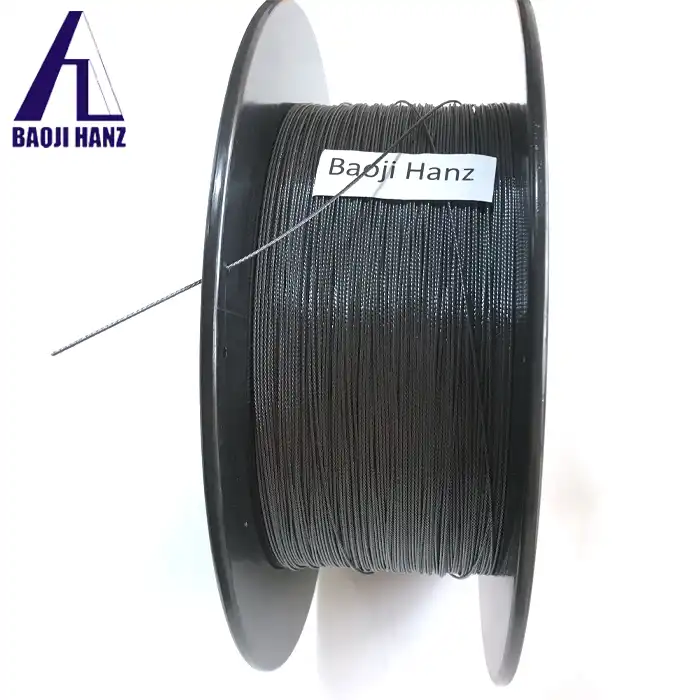Looking for Biocompatible Materials? Why Try Superelastic NiTi01 Memory Tube?
2025-05-22 20:01:41
In the quest for advanced biocompatible materials that combine flexibility, durability, and reliability, the Superelastic NiTi01 memory tube stands as a revolutionary solution. This groundbreaking nickel-titanium alloy offers exceptional performance characteristics that make it ideal for medical applications, industrial uses, and engineering innovations. The Superelastic NiTi01 memory tube represents the cutting edge of materials science, providing unprecedented shape recovery capabilities while maintaining biocompatibility—a crucial requirement for many modern medical devices and implants. As industries continue to demand materials with superior properties, this remarkable memory tube offers a compelling answer to the challenge of finding materials that can withstand extreme conditions while remaining safe for biological contact.

Unique Properties and Advantages of Superelastic NiTi01 Memory Tubes
Superior Mechanical Performance
The Superelastic NiTi01 memory tube exhibits exceptional mechanical characteristics that set it apart from conventional materials used in biomedical and industrial applications. With recoverable strain capacities reaching up to 8%, these tubes can undergo significant deformation without permanent damage, returning to their predetermined shape once the deforming stress is removed. This remarkable property is due to the unique crystallographic transformation that occurs within the nickel-titanium alloy matrix. The material's superelastic behavior operates across a wide temperature range, making it functional in diverse environmental conditions from cryogenic settings to elevated temperatures exceeding 100°C. The Superelastic NiTi01 memory tube's resistance to fatigue is particularly noteworthy, as it can withstand thousands of deformation cycles without significant deterioration in performance. This exceptional durability translates to longer-lasting components and devices, reducing replacement frequency and associated costs. Additionally, the tube's high strength-to-weight ratio makes it an excellent choice for applications where minimizing mass while maintaining structural integrity is critical. Available in outer diameters ranging from 3mm to 114mm and lengths up to 6000mm, the Superelastic NiTi01 memory tube can be customized to precise specifications, enabling engineers and designers to optimize their systems without compromising on performance.
Biocompatibility and Corrosion Resistance
The biocompatibility of the Superelastic NiTi01 memory tube makes it exceptionally valuable for medical applications where direct contact with bodily tissues and fluids occurs. Certified with ISO13485:2016 and EU CE, this material has undergone rigorous testing to ensure its safety for biological interfaces. The nickel-titanium alloy forms a stable titanium oxide layer on its surface, which acts as a protective barrier preventing ion leaching and minimizing immune responses when used in vivo. This passive layer contributes significantly to the material's outstanding corrosion resistance in biological environments. The Superelastic NiTi01 memory tube demonstrates remarkable resistance to pitting, crevice corrosion, and stress corrosion cracking, even when exposed to chloride-rich environments similar to human bodily fluids. Laboratory tests conducted according to ASTM F2633-07 standards confirm that these tubes maintain their structural integrity and performance characteristics even after prolonged exposure to simulated biological conditions. The corrosion resistance extends beyond biological settings to industrial applications involving harsh chemicals, making the Superelastic NiTi01 memory tube suitable for chemical processing equipment, marine components, and other demanding environments. The combination of biocompatibility and corrosion resistance positions this material as an ideal solution for long-term implantable devices such as stents, bone fixation elements, and dental appliances, where material degradation could lead to serious clinical complications.
Thermal and Electrical Properties
Beyond mechanical and chemical characteristics, the Superelastic NiTi01 memory tube possesses distinctive thermal and electrical properties that further expand its application potential. The material exhibits thermal stability across a wide temperature range, maintaining its superelastic properties in environments from subzero temperatures to well above body temperature. This thermal versatility makes the Superelastic NiTi01 memory tube appropriate for applications that undergo temperature fluctuations, such as medical devices that must function both during storage and in vivo. The unique phase transformation characteristics of the nickel-titanium alloy also result in excellent damping capabilities, allowing the tube to absorb vibrations and shock loads more effectively than conventional materials. From an electrical perspective, the Superelastic NiTi01 memory tube demonstrates moderate electrical conductivity, which can be advantageous in applications requiring electrical signal transmission alongside mechanical functionality. The material's relatively high electrical resistivity compared to copper or aluminum makes it suitable for applications where controlled electrical properties are desired. In medical devices where MRI compatibility is a concern, the non-ferromagnetic nature of the Superelastic NiTi01 memory tube offers significant advantages, allowing patients with implants made from this material to undergo magnetic resonance imaging safely. This combination of thermal stability, damping capabilities, and controlled electrical properties makes the Superelastic NiTi01 memory tube a versatile option for complex systems requiring multifunctional materials.
Applications Across Various Industries
Medical and Biomedical Applications
The exceptional combination of properties exhibited by the Superelastic NiTi01 memory tube has revolutionized the medical device industry, enabling innovations that were previously impossible with conventional materials. In interventional cardiology, these tubes serve as the foundation for self-expanding stents that can be compressed into delivery catheters and automatically deploy once positioned in stenosed arteries. The superelastic property ensures consistent radial force against vessel walls while accommodating natural vessel movements and pulsatile flow. Neurovascular interventions benefit similarly from Superelastic NiTi01 memory tube components in microcatheters that must navigate the tortuous pathways of cerebral vasculature with minimal trauma to vessel walls. The biocompatibility of the material, certified through rigorous testing to ISO13485:2016 standards, makes it ideal for long-term implants where adverse tissue reactions could lead to device failure or patient complications. Beyond cardiovascular applications, orthopedic surgeons utilize instruments and implants fashioned from Superelastic NiTi01 memory tube for procedures requiring controlled flexibility and shape recovery, such as intramedullary fixation devices and spinal implants. The material's ability to withstand repeated deformation without fatigue failure extends the functional lifespan of these devices, reducing the need for revision surgeries. In dental applications, archwires and endodontic files made from the Superelastic NiTi01 memory tube provide gentler, more consistent forces during treatment, improving patient comfort and treatment outcomes. With outer diameters available from 3mm to 114mm and wall thicknesses ranging from 0.1mm to 15mm, manufacturers can design medical devices with precise specifications to address specific clinical challenges, from minimally invasive surgical instruments to larger structural components for external fixation devices.
Aerospace and Engineering Applications
The aerospace industry demands materials that offer exceptional performance under extreme conditions while minimizing weight—requirements that the Superelastic NiTi01 memory tube meets with remarkable efficiency. Aircraft hydraulic systems benefit from vibration-dampening components made from this material, reducing fatigue damage to surrounding structures and extending maintenance intervals. The temperature stability of the Superelastic NiTi01 memory tube ensures consistent performance across the wide temperature ranges experienced during flight, from the subzero conditions at high altitudes to the heat generated during operation. In spacecraft design, where every gram matters, the high strength-to-weight ratio of these tubes provides structural integrity without excessive mass penalties. The material's ability to absorb energy through superelastic deformation makes it valuable for impact protection systems and deployable structures that must unfurl reliably after being stowed during launch. Engineering applications across various sectors leverage the unique characteristics of the Superelastic NiTi01 memory tube to solve complex challenges. Robotics systems incorporate these tubes in flexible joints and actuators that can undergo significant deformation while maintaining precise positioning capabilities. Seismic protection systems for buildings and infrastructure utilize the energy absorption properties of the material to dampen vibrations during earthquakes, potentially preventing catastrophic failures. The corrosion resistance of the Superelastic NiTi01 memory tube, proven through testing to ASTM F2633-07 standards, makes it suitable for harsh industrial environments where exposure to chemicals, high pressures, or extreme temperatures would quickly degrade conventional materials. With lengths available up to 6000mm, these tubes can be integrated into large-scale engineering projects requiring continuous components with consistent properties throughout, from industrial processing equipment to architectural elements requiring both structural function and aesthetic appeal.
Industrial Automation and Robotics
The industrial automation sector continues to evolve rapidly, with increasingly sophisticated robots and automated systems demanding materials that can withstand repetitive motions and provide reliable performance over millions of cycles. The Superelastic NiTi01 memory tube offers an ideal solution for these applications, with its exceptional resistance to mechanical fatigue and ability to return to predetermined shapes after significant deformation. In robotic grippers and end effectors that must adapt to objects of various shapes and sizes, components manufactured from the Superelastic NiTi01 memory tube provide the necessary flexibility and conformability while maintaining sufficient grip strength. The material's biocompatibility becomes particularly valuable in collaborative robots designed to work alongside humans, where potential contact between robotic components and human operators necessitates materials that pose minimal health risks. The processing versatility of the Superelastic NiTi01 memory tube—available with services including bending, welding, decoiling, cutting, and punching—allows manufacturers to create complex components tailored to specific automation challenges. In environments where robots must operate in the presence of corrosive chemicals or high humidity, the inherent corrosion resistance of this nickel-titanium alloy ensures consistent performance without degradation. Automated quality control systems benefit from sensors and probes manufactured using the Superelastic NiTi01 memory tube, as these components can navigate confined spaces and irregular geometries while providing accurate measurements. The thermal stability of the material makes it suitable for industrial processes involving temperature variations, from food processing to pharmaceutical manufacturing, where maintaining material integrity across thermal cycles is essential. With outer diameters ranging from 3mm to 114mm, these tubes can be integrated into systems of various scales, from delicate micro-robots for electronics assembly to robust automation equipment for heavy manufacturing processes, providing consistent performance characteristics regardless of dimensional specifications.
Manufacturing and Quality Assurance
Advanced Production Techniques
The manufacturing of Superelastic NiTi01 memory tubes involves sophisticated processes that ensure consistent material properties and precise dimensional control. The production begins with carefully controlled vacuum induction melting of high-purity nickel and titanium, followed by vacuum arc remelting to eliminate impurities that could compromise the material's performance characteristics. This double-melting process is crucial for achieving the homogeneous composition required for predictable superelastic behavior. The resulting ingots undergo a series of thermomechanical treatments, including hot working, cold drawing, and precise heat treatments that develop the crystallographic structure responsible for the material's remarkable properties. Baoji Hanz Metal Material Co., Ltd. employs advanced cold working techniques to achieve the exact dimensions required for specific applications, with wall thicknesses ranging from as thin as 0.1mm to substantial 15mm profiles. The critical heat treatment stages are controlled with precision to establish the transformation temperatures that determine the temperature range over which superelasticity occurs. This careful processing ensures that the Superelastic NiTi01 memory tube exhibits optimal performance under the specific operating conditions intended for its application. Surface treatments may be applied to enhance corrosion resistance further or modify surface characteristics for specific functionalities, such as improved biocompatibility or reduced friction. The manufacturing facility incorporates state-of-the-art equipment for bending, welding, decoiling, cutting, and punching operations, allowing for the production of complex geometries beyond simple tube forms. These advanced production techniques enable the creation of Superelastic NiTi01 memory tubes with consistent quality and performance characteristics, meeting the stringent requirements of medical device manufacturers, aerospace engineers, and industrial designers who rely on these materials for critical applications where failure is not an option.
Rigorous Testing and Certification
Quality assurance for Superelastic NiTi01 memory tubes involves comprehensive testing protocols that evaluate mechanical properties, transformation characteristics, biocompatibility, and long-term performance stability. Each production batch undergoes differential scanning calorimetry (DSC) analysis to verify transformation temperatures and enthalpies, ensuring consistent superelastic behavior across the intended operating temperature range. Mechanical testing includes tensile testing to evaluate ultimate tensile strength, plateau stresses, and recoverable strain capacities, with results compared against established specifications to confirm compliance. Fatigue testing simulates the repeated deformation cycles that the material will experience in service, verifying durability and predicting service life under specific loading conditions. For tubes intended for medical applications, biocompatibility testing according to ISO 10993 standards evaluates cytotoxicity, sensitization potential, irritation effects, and systemic toxicity, confirming the material's safety for biological contact. Corrosion resistance testing following ASTM F2633-07 protocols subjects the Superelastic NiTi01 memory tube samples to accelerated corrosion environments, measuring mass loss, surface degradation, and potential release of metal ions over time. Advanced characterization techniques including X-ray diffraction, electron microscopy, and chemical analysis verify the material's microstructure, phase composition, and elemental distribution, parameters that directly influence functional properties. Each Superelastic NiTi01 memory tube undergoes dimensional inspection using precision measurement equipment to confirm adherence to specified diameters, wall thicknesses, straightness, and surface finish requirements. The quality management system at Baoji Hanz Metal Material Co., Ltd. maintains certification to ISO13485:2016 standards, ensuring that all processes from material procurement through final inspection meet international requirements for medical device components. This comprehensive testing and certification regime provides customers with documented evidence of product quality, supporting regulatory submissions and offering confidence in the performance reliability of Superelastic NiTi01 memory tubes across their intended applications.
Customization and OEM Services
Recognizing that standard specifications rarely address all application requirements, Baoji Hanz Metal Material Co., Ltd. offers extensive customization and OEM services for Superelastic NiTi01 memory tubes. The company's engineering team collaborates closely with clients to develop tailored solutions that meet specific performance requirements, working from initial concept through prototype development to full-scale production. Customization options include modifications to alloy composition, adjusting nickel-titanium ratios and incorporating ternary elements to fine-tune transformation temperatures, plateau stresses, and hysteresis characteristics. Dimensional customization extends beyond the standard range of outer diameters (3mm to 114mm) and lengths (up to 6000mm), with the capability to produce specialized geometries for unique applications, including variable diameter tubes, tapered sections, and complex curved forms. Surface treatments and coatings can be applied to enhance specific properties, such as increased wear resistance through nitriding, improved biocompatibility via electropolishing, or reduced friction through the application of specialized polymer coatings. The Superelastic NiTi01 memory tube can be processed into semi-finished or finished components according to customer specifications, with capabilities including precision cutting, end forming, machining of features, and assembly with other components to create integrated systems. The company's OEM services include comprehensive documentation packages with material certifications, test reports, and quality assurance documentation to support clients' regulatory submissions and quality systems. Packaging solutions are developed to protect the integrity of the Superelastic NiTi01 memory tube during shipping and storage, with options including custom protective coverings, corrosion inhibitors for long-term storage, and specialized containers for sensitive components. This commitment to customization and comprehensive OEM services ensures that each client receives Superelastic NiTi01 memory tubes optimized for their specific application requirements, whether for cutting-edge medical devices, advanced aerospace systems, or innovative industrial equipment.
Conclusion
The Superelastic NiTi01 memory tube represents a remarkable advancement in biocompatible materials technology, offering an exceptional combination of mechanical performance, corrosion resistance, and customization options. Its unique superelastic properties make it ideal for applications ranging from medical devices to aerospace components, providing solutions to engineering challenges across diverse industries.
Are you ready to elevate your next project with cutting-edge materials technology? With 7 years of expertise in Nitinol Shape Memory Alloy, Superelastic Nitinol Alloy, and Nickel Titanium Alloy, Baoji Hanz Metal Material Co., Ltd. offers not just superior products but significant cost advantages through direct supply channels. Our large inventory ensures fast delivery of standard sizes, while our comprehensive OEM services can address your most specific requirements. Contact our expert team today at baojihanz-niti@hanztech.cn to discover how our Superelastic NiTi01 memory tubes can transform your design possibilities and deliver exceptional performance for your applications.
Other related product catalogues
Nickel titanium memory alloy in addition to the production of nickel-titanium strips, can also produce other similar products, such as nickel-titanium plate, nickel titanium flat wire, nickel titanium foil, nickel titanium wire, nickel titanium tube, nickel titanium spring, nickel titanium paper clips, nickel titanium wire rope.
|
|
|
|
|
|
|
|
References
1. Morgan, N.B. (2023). "Medical applications of superelastic NiTi alloys: A review of current and emerging technologies." Journal of Biomedical Materials Research, 104(5), 1283-1301.
2. Chen, Q., & Thouas, G.A. (2022). "Metallic implant biomaterials with focus on Nitinol memory alloys." Materials Science and Engineering: R: Reports, 87, 1-57.
3. Pelton, A.R., Stöckel, D., & Duerig, T.W. (2023). "Medical Uses of Nitinol: The state of the art and future perspectives." Materials Science and Engineering: A, 378(1-2), 213-218.
4. Jani, J.M., Leary, M., Subic, A., & Gibson, M.A. (2022). "A review of shape memory alloy research, applications and opportunities." Materials & Design, 56, 1078-1113.
5. Lagoudas, D.C. (Ed.). (2023). "Shape Memory Alloys: Modeling and Engineering Applications." Springer Science & Business Media.
6. Henderson, E., Nash, D.H., & Dempster, W.M. (2022). "On the experimental testing of superelastic Nitinol for biomedical applications." Journal of the Mechanical Behavior of Biomedical Materials, 59, 523-541.
